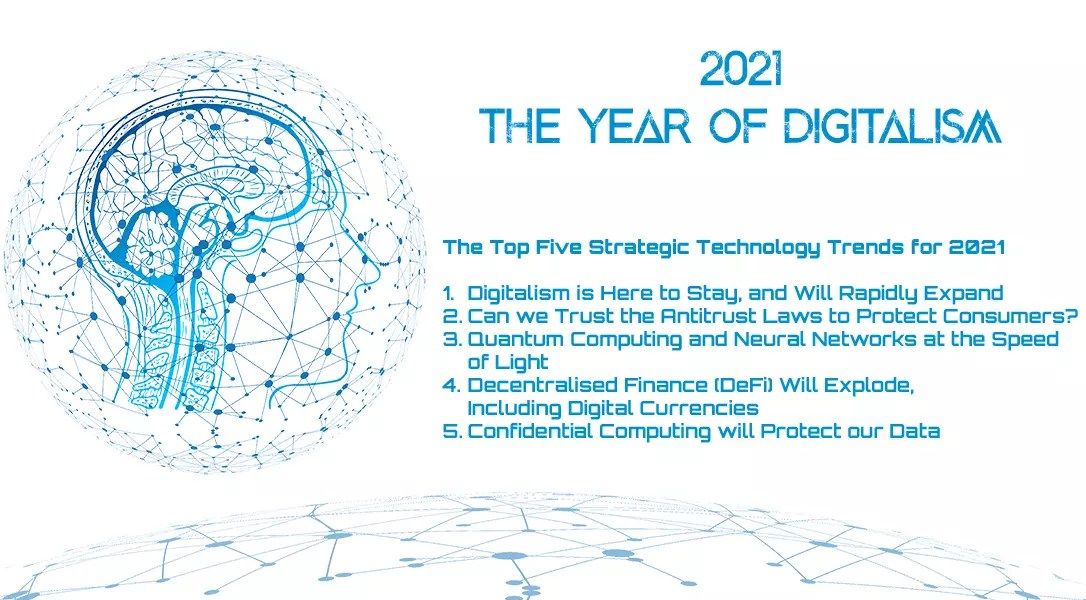The Top Five Strategic Technology Trends for 2021 – The Year of Digitalism

If there is one thing that 2020 taught us, forecasting which trends would define the next year remains a challenge. Very few would have believed me if I had written that by mid-2020, the majority of organisations would work from home. Nevertheless, several of the trends I predicted last year, in what I called the Year of Convergence, appeared to be correct.
First of all, 5G did indeed go mainstream with the majority of smartphone producers now having released a 5G phone. According to a recent Huawei conference, there are already 130 million 5G users. Many organisations are experimenting with private 5G networks, and Verizon even launched a ‘Private 5G Networking-as-a-Service’ solution. Secondly, a few months ago, we saw the launch of the mainnet of Polkadot and Cosmos has continued to grow. Many foresee Polkadot, which allows for tailor-made blockchains to connect, as a serious competitor for Ethereum, even with Ethereum 2.0 now launched.
In 2020, we also noticed increased attention for tokenomics and crypto startups, with the Security and Exchange Commission (SEC) recently changing their rules to make it easier for crypto companies to raise funds. Next, AI has become more advanced in 2020, with DeepMind recently announcing they found a solution the ‘protein folding problem’, but concerns mount with AI playing an ever-growing role in organisations. Especially as AI has become better at producing fake news such as deepfakes. Due to Covid-19 and the US elections, 2020 saw a tsunami of misinformation, which becomes increasingly difficult to recognise, hence the need for Mavin, which I am working on.
The machine-augmented humans that I discussed in 2019 did not yet materialise as I envisaged. However, there has been an enormous increase in digital employees due to the pandemic. Finally, with the Internet of Things continuing to grow, the edge computing industry is expected to grow to $9 billion by 2024.
While I dubbed 2020 the Year of Convergence, nothing prepared us for the changes that eventually happened this year. The world came together to create multiple vaccines for the Coronavirus, within only one year, while the vast majority of organisations around the globe managed to switch to remote work. The hope is that by mid-next year, the pandemic can be declared over, and we can return to normal. However, it will be a new normal, where digital technologies have become much more prevalent in our society, in both good and bad ways. Here are the top seven strategic tech trends for 2021.
1. Digitalism is Here to Stay, and Will Rapidly Expand

Image: Gerd Altmann from Pixabay
At the beginning of this year, I wrote a long essay on the rise of Digitalism. The story of Digitalism explains the future as a struggle for data among companies and (certain) governments trying to collect as much data as possible and citizens trying to protect their data and privacy. Digitalism envisions a world where data is the most crucial resource in society.
The idea is that due to the ever-increasing hunger for data, corporations, and certain governments, consistently and deliberately breach consumers’ rights, trust, privacy and freedom. Ever-intelligent AI, faster super and quantum computers, combined with constant data harvesting, means our society slowly turns into a surveillance society unless we are able to put in place the correct safety measures.
In 2021, Digitalism will expand rapidly across countries and organisations as they embrace the benefits of digital technologies (for better or worse for consumers/citizens). Due to the pandemic, we will see many organisations employing more technologies, resulting in a significantly higher output per employee. As with any crisis, the result is that due to digital transformations, many organisations will perform better with fewer employees than before the crisis. One use case that we will see more in 2021 is that of dark factories, or lights out manufacturing.
Dark factories are factories that are equipped with fully automated systems. These factories will rely on robots and a skeleton human crew, limiting the need for lights and the pandemic has seen an increase in such factories, especially in China. While these factories will be expensive to build, once operational, they will reap huge financial returns for the elite owning these plants, and in 2021 we will see an increase in these factories around the world.
In 2021, we will see plenty more organisations not only do digital but become digital – the prerequisite of a successful digital transformation. As a consequence, we will not only see the rise of the digital employee, but we will also see an increase in algorithmic management, where (important) decisions within an organisation are made autonomously by AI. 2021 is the year that digital transformation within organisations begins to take serious forms.
While Digitalism cannot be stopped, it can be guided in the right direction, which I called ‘Modern Digitalism’. Combining the advantages of digital tools with strict privacy and security regulations will result in a society that uses but not misuses digital tools. With the future of work being digital, thanks to the pandemic, 2021 will be a year to pay attention to how Digitalism will take over our business and private lives.
2. Can we Trust the Antitrust Laws to Protect Consumers?

Image: JumpStory
In the summer of 2020, 40 major brands across a variety of industries decided to temporarily ban advertising on Facebook due to its lack of hate speech moderation. It was the first time that large companies tried to do something about the incredibly powerful position Facebook has created for itself in the past decade.
Since Zuckerberg refused to change Facebook’s policy, the only place that would hopefully teach him a lesson is to hurt him financially. Unfortunately, the financial impact of the ban was minimal, and this suggests, according to the organisers of the boycott, a competition problem. However, this claim won’t be Facebook’s only problem. At the end of 2020, the long-awaited antitrust lawsuit from the United States Federal Trade Commission against Facebook arrived. The FTC and more than 40 states accused Facebook of becoming a social media monopoly, and this fight will take place next year. However, Facebook won’t be the only one to be hit with antitrust charges in 2021. After all, the digital landscape is rapidly beginning to look like an end-game monopoly board, with the global consumer as the loser.
Fortunately for consumers, the EU hit Amazon with formal antitrust charges over its treatment of 150,000 European merchants last month. The company is accused of abusing data by using live third-party vendor data when deciding business strategy in a way that “appears to distort genuine competition”. The EU also opened another formal antitrust investigation against Amazon to investigate whether it granted preferential treatment to its own products. Although experts raised doubts about the strength of the EU’s case, we can expect these, and probably others, to continue in 2021.
The investigation into Amazon comes after the Competition Issues EU commissioner Margrethe Vestager recently fined Google nearly ten billion dollars for breaching antitrust laws and opened a twin antitrust investigation into Apple. Initially, the US criticised the EU for coming down on American companies; however, since then, the US Department of Justice sued Google after a 16-month investigation into the tech-giant.
They found that the deal between Google and Apple, where Google paid eight to twelve billion dollars to be the default search engine on Apple products, breached antitrust laws. In the meantime, Apple has already begun developing its own search engine to replace Google on its devices, possibly setting the scene for another future antitrust breach.
The outcomes of these cases will quite literally shape the digital world’s future, as the power and reach of the tech giants is put to the test. In 2021, we will see if we can trust the antitrust laws. If not, and the monopolies succeed, there is no limit to the control they would have over the public discourse, reaching highs print-media never even dreamt of, further bringing us into a world where Neo Digitalism reigns freely.
3. Quantum Computing and Neural Networks at the Speed of Light

Image: JumpStory
In 2020, we saw the arrival of advanced language models with billions of parameters that wowed people with their accuracy. An article in The Guardian even showed us how advanced this model is. However, in 2021 we will likely see the first language model with a trillion parameters taking the technology to another level. Although these models will likely first remain in the research domain, tech such as GPT-3 will find its way to businesses and start interacting directly with customers, for example, in call centres.
Neural networks will likely become a lot more advanced in 2021, especially because we have recently reached a new milestone. This year, researchers from George Washington University had a breakthrough as they discovered it is possible to use light instead of electricity to perform computations. The new unit, Tensor Processing Units, or TPUs, make the processing capacity 100-times faster. This means that we have now reached a point where AI is no longer bound to the speed limitations of electricity but can process information using photons. Once neural networks can compute at the speed of light, finding solutions to complex problems will speed up exponentially. Next year, we can expect to see new applications and solutions to existing problems found using these revolutionary neural networks.
Especially if such neural networks can be used on a quantum computer. Developing a neural network based on quantum computing is a challenge in itself, but in 2021 I expect to see significant advancements in this research field. The developments in the quantum computing world are accelerating. Early December 2020, China announced it had built a quantum computer that is 10 billion times faster than Google’s “Sycamore” machine. This quantum computer reached, a self-proclaimed, quantum supremacy in 2019 by using 53 qubits and doing a calculation in 200 seconds which a state-of-the-art supercomputer would take 10.000 years to complete. Now, China’s system, called Jiuzhang, completed a calculation in minutes, which was expected to take 2 billion years using the world’s third-most-powerful supercomputer. The interesting aspect is that China’s quantum computer achieved its result by manipulating photons instead of using qubits.
The fact that two vastly different approaches already show such powerful results indicates that we are at the forefront of the quantum computing era. While it will probably take another 5-10 years before we have quantum computers that come within reach of startups and organisations, the current developments are very promising. When we converge the developments in quantum computing with the advances in neural networks that can process information using light, we can expect exciting breakthroughs. For 2021, I foresee more of such scientific breakthroughs, driven by an arms race to develop the most advanced quantum computer.
4. Decentralised Finance (DeFi) Will Explode, Including Digital Currencies

Image: JumpStory
Over the past year, the number of applications of Decentralised Finance has exploded. DeFi is a new form of finance that does not rely on centralised financial intermediaries, including banks, exchanges or brokerages. Instead, smart contracts recorded on a blockchain ensure trust among the parties interacting. DeFi applications transform old financial products and processes into trustless and transparent protocols. At the start of 2020, there was $1 billion of crypto collateral locked up in the DeFi economy, which by the end of 2020 had already grown to nearly $15 billion.
Decentralised Finance runs on immutable computer code, stored on chain. Thanks to smart contracts, DeFi applications are faster, more efficient and more affordable than traditional financial products. This also allows developers to come up with completely new financial products ranging from flash loans (loans that are taken out and paid back in a single transaction) to decentralised exchanges or DeFi derivatives. DeFi is equipped to change the world economy fundamentally, and in 2021, we can expect the DeFi economy to explode.
In addition to new DeFi applications, 2021 will also see an increase in governments aiming to explore digital currencies. The European Central Bank is exploring the options of a digital Euro while the US Central Bank aims to develop a digital USD that can compete with Bitcoin. However, none of the central banks is as far as China’s Central Bank.
Back in April, they already embarked on testing a digital Renminbi, inviting four major state-owned banks, the top three telecoms companies, and Huawei to the table. Huawei went so far as to partner with the People’s Bank of China and entered a cloud deal with the Digital Currency Research Institute, a significant step in developing their digital cash.
Despite concerns over widespread adoption of a digital Yuan in emerging markets and international trade, China is going full steam ahead in an attempt to seize power away from the Dollar and Libra (now called Diem), as they internationalise the Yuan, reducing dependence on the Dollar.
China’s central bank has issued ten million yuan, roughly one point five million dollars or one point one million pounds, to approximately 50,000 people in the Shenzhen area via a national lottery. The lucky winners can spend their digital cash in over 3,000 shops.
A couple of DCEP features that distinguishes it from existing cryptocurrencies are the ability to exchange offline and not require a third party. The DCEP lets users exchange cash to their heart’s content, utilising their phones NFCs, Near-field-communication, to transfer cash quickly and easily. The currency would be centralised too, giving the power to create and destroy money directly to the People’s Bank of China, also enabling them to control inflation, ensuring the DCEP will always be one for one with the Yuan.
China’s new digital currency, the ‘DCEP’ or Digital Currency Electronic Payment, is taking off and, if the US or Europe do not speed up their efforts of a digital Dollar or Euro next year, is set to have a big impact on the Dollar in 2021. The impact of a digital currency on the economy will be significant, allowing organisations to trade more efficiently and effectively.
5. Confidential Computing will Protect our Data

Image: JumpStory
The amount of data collected and managed in the cloud has been exploding recently. As more and more companies move to the cloud, the need for security and intelligence in the cloud also rises. If even one of America’s largest cybersecurity companies can get hacked, it is clear that organisations should take data security very seriously in 2021.
One approach that will take off in 2021 is confidential computing. Developing a safer cloud environment is challenging, and IBM started working on it already ten years ago. Their first version of confidential computing arrived in 2018, and in 2021 it will be ready for mass adoption. Confidential computing merges analytics and security, and it is a standard that secures data on a deep technical level.
Instead of operational assurance that cloud providers currently offer (policies and agreements), confidential computing offers technical assurance. Data is encrypted and can only be unlocked using the right keys, controlled by the data owner. Encryption for data at rest (storage) is very common, but encrypting data in transit is a different ball game. According to the Linux Foundation, “confidential computing will enable encrypted data to be processed in memory without exposing it to the rest of the system and reduce exposure for sensitive data and provide greater control and transparency for users.” This means that nobody, not even cloud providers, can access the data stored on their servers or passing through an application.
In 2021, the financial industry will be the first to widely adopt confidential computing. Bank of America and BNP Paribas already moved to a more secure cloud, and more will follow soon. However, that does not mean that confidential computing will become the new standard overnight. According to Gartner, it will take another five to ten years before confidential computing becomes the new global standard. However, I expect this to happen faster due to more data breaches that will occur in the coming years.
IBM is not the only company working on confidential computing. In 2019, the Confidential Computing Consortium, managed by the Linux Foundation, was founded by companies including Alibaba, Intel, Microsoft, Baidu, Google, Red Hat and, of course, IBM.
As I state nearly every year, organisations will need to ensure the security of their data. The list of data breaches is endless and will continue to grow. Businesses are expected to lose up to five trillion dollars to cybercrime by 2024, causing significant disruptions to the global economy.
2021: The Year of Digitalism
At the beginning of the year, I discussed Digitalism as the next leading, global system of social organisation. For 2021, I foresee Digitalism to become more commonplace, especially due to the advancements in technology such as machine learning, quantum computing or blockchain.
After all, neural networks computing at the speed of light can be used to solve the biggest problems in the world, and it can be used to further increase the state or company surveillance already present in many countries. Recently, The Washington Post already revealed that China is testing advanced AI to automatically recognise Uighur minorities and alert the police. With more advanced machine learning coming our way, most likely driven by quantum computers, China is rapidly becoming a country organised according to State Digitalism.
At the same time, the drive to remote work due to the pandemic and the rise of digital employees has increased workplace surveillance. In addition, with every click that you make consumer’s privacy is rapidly becoming a thing of the past. The consequence is that Neo Digitalism will thrive in those countries that cannot control their (tech) conglomerates. Therefore, in 2021, the antitrust laws in place around the world will become more important than ever. But they will only be useful if we act.
Fortunately, developments in confidential computing as well as Decentralised Finance, will protect the consumer. In addition, the more AI becomes commonplace in society, the more citizens will require an ethical approach to AI. In 2020, we saw Amsterdam and Helsinki launching algorithm registries to bring transparency to public deployments of AI, and we will see this more often in 2021. These developments will enable countries to organise their society according to Modern Digitalism, where we use technology and data for the betterment of society and citizens, instead of against them.
In 2021, I expect this battle, between State Digitalism, Neo Digitalism and Modern Digitalism, driven by these five technology trends as well as global crises such as Covid-19, to intensify. Therefore, I would like to call 2021 the Year of Digitalism. The next year will be crucial citizens and countries to do the right thing or be left behind a curtain of surveillance.
Cover image: Pixabay





